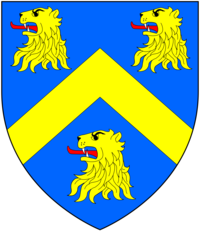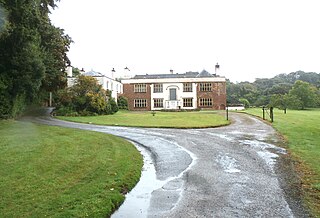Thomas Wyndham BCL DCL (1772-1862), was a 19th-century English Doctor of Divinity and scion of one of the most influential families in the West Country of England.
Contents




Thomas Wyndham BCL DCL (1772-1862), was a 19th-century English Doctor of Divinity and scion of one of the most influential families in the West Country of England.




The Rev Dr Wyndham was the second son of William Wyndham of Dinton, Wiltshire, a lineal descendant of Sir John Wyndham and Sir Wadham Wyndham. [1]
Like his namesake and first cousin Thomas Wyndham, he was educated at Sherborne and Wadham College, Oxford, [2] the college founded by his ancestress Dorothy Wadham, thereby enabling members of the Wyndham family to claim Founders' kin. He matriculated on 12 March 1788, aged 16, obtaining his BCL in 1794 and DCL in 1809.
Dr Wyndham's preferment greatly benefitted from the patronage of his family connections, commencing in 1801 as vicar of Compton Chamberlayne, the living of which was held by his kinsman John Penruddocke. In 1806 he was made rector of Pimperne under the patronage of his kinsman Henry Portman, which he held until his death in 1862. In 1809 Dr Wyndham also became rector of Melcombe Regis in Dorset, a favourite holiday resort of King George III, which he held until 1859. [3]
In 1791 The Rev Dr Wyndham was appointed Steward, along with Edward Phelips, of the Anniversary Meeting at Sherborne School. The event took place on 22 August, the celebrations comprising a series of public readings from both modern and classical poets beginning at noon, followed by an ordinary [i.e. lunch] at the Antelope Inn at three o'clock, and concluding with a ball at Sherborne Town Hall in the evening. [4]
In 1809 Dr Wyndham married Anne, the eldest daughter of ardent foxhunter [5] Walter Stubbs of Beckbury, Shorpshire. They had one son, Thomas Wyndham, who in 1842 married Anne, daughter of Captain Thomas Penruddocke, thus further securing the connection between two of the West Country's leading gentry families. [6]
Whether Dr Wyndham enjoyed fox hunting is not recorded, perhaps because at the time hunting was somewhat frowned upon in a clergyman, however by the 1820s he owned Beckbury Hall in Shropshire, and in 1837 acquired the surrounding estate and manor of Beckbury from the heirs of Sir John Astley. In 1850 he sold the Hall and 68 acres to his father-in-law Walter Stubbs, owner of the adjoining Lower Hall. [7]

Colonel Sir John Penruddock, of Compton Chamberlayne, was an English Cavalier during the English Civil War and the English Interregnum. He is remembered as the leader of the Penruddock uprising in 1655.

Badger is a village and civil parish in Shropshire, England, about six miles north-east of Bridgnorth. The parish had a population of 134 according to the 2001 census, falling to 126 at the 2011 census.

Dinton is a village, civil parish and former manor in Wiltshire, England, in the Nadder valley on the B3089 road about 8 miles (13 km) west of Salisbury. The parish population was 696 at the 2011 census, estimated at 733 in 2019. The civil parish includes the village of Baverstock, about 1 mile (1.6 km) east of Dinton village.

Nicholas Wadham of Merryfield in the parish of Ilton, Somerset, and Edge in the parish of Branscombe, Devon, was a posthumous co-founder of Wadham College, Oxford, with his wife Dorothy Wadham who, outliving him, saw the project through to completion in her late old age. He was Sheriff of Somerset in 1585.

Sir Wadham Wyndham, of Ilton, Somerset and St. Edmund’s College, Salisbury, was a Justice of the King's Bench from 1660 to 1668.
Henry Penruddocke Wyndham (1736–1819) MP JP FSA FRS, was a British Whig Member of Parliament, topographer and author.

Orchard Wyndham is a historic manor near Williton in Somerset, centred on the synonymous grade I listed manor house of Orchard Wyndham that was situated historically in the parish of Watchet and about two miles south of the parish church of St Decuman's, Watchet. Parts of the manor house are medieval. It has been owned for more than 700 years by the prominent Wyndham family, who continue there as of 2015.

John Hungerford Penruddocke was a Tory politician in the United Kingdom.
Thomas Penruddocke DL, of Compton Chamberlayne was a Wiltshire landowner and politician, briefly member of parliament for Wilton in 1679 and again in 1689.
The High Sheriff of Carlow was the British Crown's judicial representative in County Carlow, Ireland from the 14th century until 1922, when the office was abolished in the new Free State and replaced by the office of Carlow County Sheriff. The sheriff had judicial, electoral, ceremonial and administrative functions and executed High Court Writs. In 1908, an Order in Council made the Lord-Lieutenant the Sovereign's prime representative in a county and reduced the High Sheriff's precedence. However, the sheriff retained his responsibilities for the preservation of law and order in the county. The usual procedure for appointing the sheriff from 1660 onwards was that three persons were nominated at the beginning of each year from the county and the Lord Lieutenant then appointed his choice as High Sheriff for the remainder of the year. Often the other nominees were appointed as under-sheriffs. Sometimes a sheriff did not fulfil his entire term through death or other event and another sheriff was then appointed for the remainder of the year. The dates given hereunder are the dates of appointment. All addresses are in County Carlow unless stated otherwise.

Sir John Wyndham of Orchard Wyndham in the parish of Watchet, Somerset, was born a member of a prominent gentry family in Norfolk and founded his own prominent gentry family in Somerset, which survives today at Orchard Wyndham.
Wadham Penruddock Wyndham was a British Member of Parliament.
Captain Thomas Tyrwhitt-Drake was a British Member of Parliament (MP) for Amersham from 1805 to 1832.
Miles Barne was an English land-owner and a Member of Parliament for Dunwich between 1747 and 1754, and again between 1764 and 1777. Born into a family long associated with London merchant circles, Barne accumulated sufficient wealth to purchase an estate in Suffolk and became prominent amongst local freeman. Dunwich in Suffolk, his constituency, was a pocket borough, controlled by the Downing land-owning family; Barne, the local Vanneck family and the freemen of the borough slowly ousted the Downings' influence and Barne established himself as one of the town's new members, which gave his family the seat until it was abolished in the 1832 Reforms.
William Mostyn Owen, born William Mostyn, was a British land-owner and politician who sat in the House of Commons from 1774 to 1795.

Dr Egerton Leigh, was an 18th-century Anglican clergyman and landowner in North West England.

Richard Knight (1659–1745), of Downton Hall, in the parish of Downton on the Rock in Herefordshire, England, was a wealthy ironmaster who operated the Bringewood Ironworks, on the Downton estate, and founded a large fortune and family dynasty.

William Wyndham JP DL (1796–1862), sometimes numbered William Wyndham V, was a Wiltshire landowner and Member of Parliament.